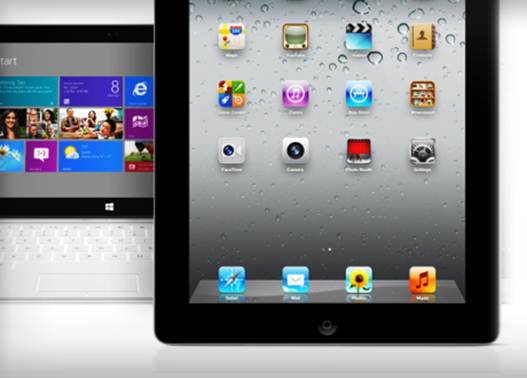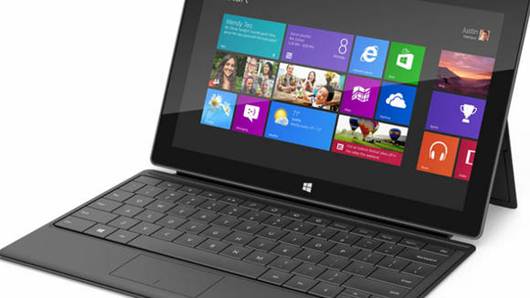It’s all about the apps says barry
collins
My wishlist needed another expensive gadget
about as much as New Zealand needed a space programme, but I’ve got my eye on a
Windows 8 Pro Surface tablet. A slip-in-the-bag device that can be used to run
full-fat Office apps, bash out sarcastic Tweets on my lap while watching
Question Time, and play Football Manager? I’ll have one of those, subject to
the actual device living up to its promise when it enters our Labs.

Surface
won’t sell Windows 8
Several commentators claim the Surface
tablets are designed to give OEMs a much-needed kick up the posterior; that
Microsoft going into battle with its partners is long- overdue punishment for
years of tedious laptops with disobedient trackpads, which come preloaded with
enough Crapware that you can read a Game of Thrones novel in between reboots.
Certainly, six months after the first Ultrabooks arrived in the PC&TA Labs,
we’ve yet to see anything that matches the elegance of the MacBook Airs [which
we’ve reviewed this month over on p40 - Ed.].
Still, it’s a bit rich for Microsoft to
imply the hardware makers can’t be trusted to make a decent tablet. Richer than
Jimmy Carr, in fact. Remember this is the company that thought making Windows 7
“touch-friendly” involved little more than increasing the size of taskbar
icons, forcing OEMs to develop touch UTs to sit on top of the operating system
for touchscreen PCs. Is it any wonder that, in the two and a half years since
the iPad was launched, none of the major manufacturers has bothered to release
a consumer-grade Windows tablet?
Instead, they’ve got on with producing good
tablet hardware for rival OSes. The Asus Transformer Pad Infinity and Samsung
Galaxy Tab 7.7- the latter of which wouldn’t look out of place with an Apple
logo on the back - have proved that third-party manufacturers can deliver
delicious tablet hardware when they set their minds to it. Now, finally, when
they’re gearing up to splash their marketing budgets on Windows 8 tablets,
they’re unexpectedly scooped by Microsoft, which unveils its own tablets months
before the OS they’re running on has even been finished.
As audacious as the Surface launch is,
Microsoft clearly isn’t about to “do an Apple” and reserve its own OS for its own
hardware. This is why it’s forced to make silly concessions, such as promising
OEMs they “will have cost and feature parity on Windows 8 and Windows RT”.
How’s that going to work? Even if Microsoft performs accounting contortions
that result in its hardware division being charged the same price as the likes
of Dell for the Windows 8 licences, the money still flows back into Microsoft’s
pockets. It’s still $75 better off per PC than the OEMs, unless it plans to
donate the licence revenue to Save The Dolphins or something equally unlikely
for them.

As
audacious as the Surface launch is, Microsoft clearly isn’t about to “do an
Apple” and reserve its own OS for its own hardware.
Still, consumers aren’t going to lose any
sleep over the OEMs’ bottom line. They’re going to buy the best tablet they can
get their hands on, irrespective of the manufacturer. The big question is
whether that tablet will be a Windows 8/RT one at all?
Many people remain deeply unconvinced by
Windows 8, our own Jon Honeyball among them [and how - see page 114 for Jon’s
take on the ‘7iouors”of Windows 8- Ed.]. But the factor that will make or break
Windows 8 tablets isn’t whether the kickstand closes with the satisfactory thud
of a Bentley’s door, or if its edges are smoother than Steve Ballmer’s pate.
The defining factor will be its apps, and here Windows 8/RT currently leaves
much to be desired.
Our round-up of Metro apps shows promise,
especially from Microsoft’s own apps, but there isn’t a single app in the
Windows Store currently for which I’d stick my grandmother on eBay. It’s early
days: the Store hasn’t been fully launched and, crucially, the payment
mechanism isn’t up and running. We can only hope developers are waiting until
they can start charging, or will be able to reach a large enough audience for
in-app advertising on free titles.
Would Microsoft have been better off
spending the past nine months since Windows 8 was unveiled - let alone the past
three years it’s reportedly spent prototyping Surface - developing a small
portfolio of must-have apps for Windows 8? I think it would. There won’t be
another public beta of Windows 8 before it launches later this year, so where
are the Metro versions of Word, Excel and PowerPoint? Why isn’t SkyDrive fully
integrated into Windows 8 yet? Why do none of the Xbox Live games work at the
time of writing?
If you’re going to start showing your
hardware partners how to do their job properly, you’d better make sure that
your own house is in order first.